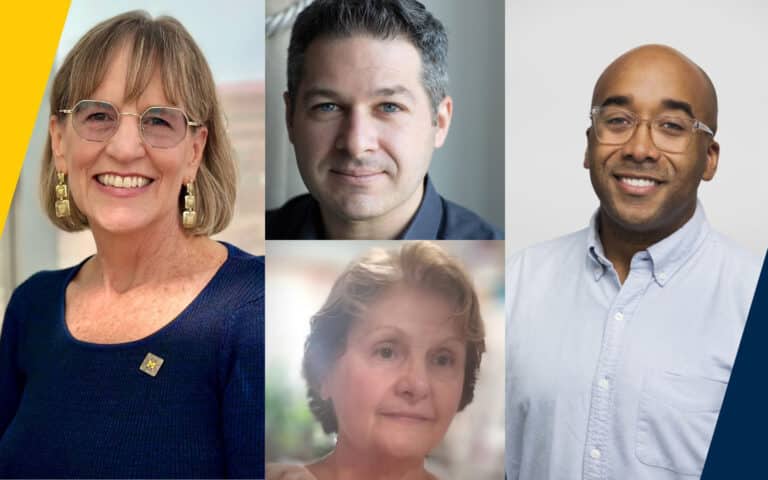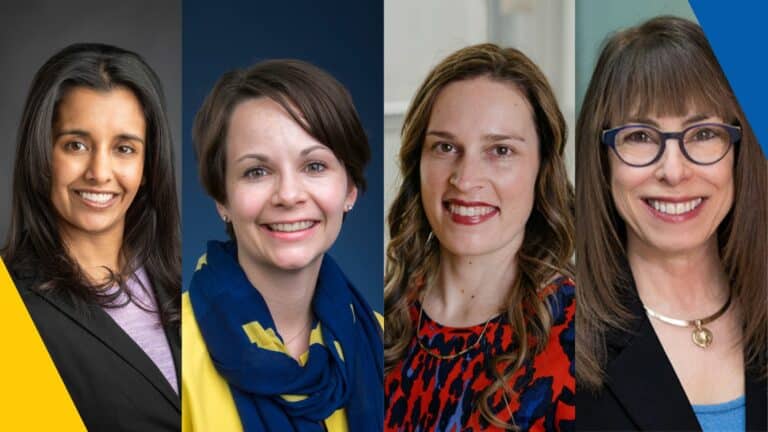Michigan Ross Business+Impact Team Empowers Students to be Architects of an Equitable and Sustainable Future
More exciting and innovative ideas are coming out of the Michigan Ross +Impact Studio. At the start of the winter 2023 term, the +Impact Studio course returned for the fifth year in a row, inviting interdisciplinary students from across the university to collaborate on projects that will have true societal impact. This year, 37 students from Michigan Ross; the School of Information; the School of Social Work; the Gerald R. Ford School of Public Policy; the College of Literature, Science and the Arts; and the School for Environment and Sustainability are working together to develop models for creating equitable enterprises for the green energy transition in Detroit.
The +Impact Studio course was launched in 2019 by Jerry Davis, the faculty director of Business+Impact. The course aims to translate the good ideas that are generated through university research into solutions to address real world issues. It gives students the opportunity to enhance their research, design, and critical-thinking skills, while developing an innovation toolkit for employers across industries.
Green energy for the future
The idea for this year’s course came about when President Joe Biden signed the Inflation Reduction Act in August 2022. The act has made an unprecedented amount of capital available for green energy businesses in order to help the country transition to an electrified economy rooted in renewable energy. It also strives to distribute that money to people and communities who have been systemically underserved. However, knowing how to access that capital can be very difficult, especially for underserved communities and businesses. That is where the +Impact Studio Course comes into play.
“There are a lot of opportunities in Detroit to start new green energy businesses, but to make that leap you need to share information with people on what those opportunities are and what they need to do to seize them,” said Davis. “The students are developing full-scale business models so that if someone wants to start their own business in green energy, they can do it.”
At the start of the course, the students had to identify the greatest barriers to green energy conversion and launching a green energy business. Based on their findings, they have written a series of three dozen how-to guides that will be made available for businesses and entrepreneurs that may be interested in green energy and the funding that is provided from the government.
“One of the first things we asked the students to do was interview a small business owner or a community leader in Detroit about their energy struggles,” said Davis. The students were pretty surprised to learn how big of a deal energy is in Detroit. They are getting real enlightenment about the business conditions in Detroit and the struggles that are out there.”
Architects for a just future
Since 2022, the +Impact Studio course has been taught jointly by Davis and Cat Johnson, managing director of the Business+Impact Initiative and LEO adjunct lecturer. Davis’ teaching focuses on the building blocks of business and ways to reimagine capitalism. With a background in business and social work, Johnson’s teaching focuses on designing with equity always in mind.
“We like to refer to our students as ‘architects for a just future,’” said Johnson. “I hope that the students in the class become champions for equity-centered business and equity-centered design.”
Over the years, the +Impact Studio Course has tackled a variety of issues and themes, with a pilot course that focused on methods for locating and removing lead service lines in Flint, Mich. Additionally, the course has covered inclusive financing, surviving the economic downturn as a result of the COVID-19 pandemic, and job loss in the restaurant industry. Each year, the students develop impactful ideas that have made a real difference for local Michigan communities.
“The dream is that the students will end up with a really thoughtful and creative toolkit to be able to design structures and concepts with equity at the center,” said Davis. “Overall, my hope is that business education will look different in the future because it will have a focus on equity to make the world a better place.”







